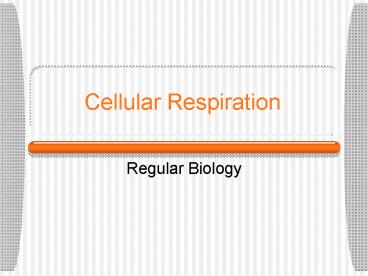Cellular Respiration PowerPoint PPT Presentation
1 / 15
Title: Cellular Respiration
1
Cellular Respiration
- Regular Biology
2
What is Cellular Respiration?
- Step-by-step breakdown of high-energy glucose
molecules to release energy - Takes place day and night in all living cells
- Occurs in stages, controlled by enzymes
3
Where does it occur?
- In the Cell
- Mitochondrion
- Outer Membrane
- Inner Membrane
4
Different types of Cellular Respiration
- Anaerobic respiration
- Usually occurs when there is no oxygen available
- When partially breaking down glucose, this
process releases a very small amount of energy.
- Aerobic respiration
- Occurs in the presence of oxygen
- When chemically breaking down glucose completely,
this process releases large amounts energy
5
Stage 1 Glycolysis
- means "splitting sugars" .6 carbon glucose is
split into two 3 carbon molecules (pyruvate) - Occurs in the cytoplasm of cells
- With or Without O2 not required (anaerobic)
- Some ATP produced
- Net yield 2 ATPs
6
The Krebs Cycle(a.k.a. citric acid cycle)
- Occurs in the mitochondria
- O2 required (aerobic)
- CO2 (waste)
- Some ATP produced
- Net yield 2 ATPs
7
SUMMARY OF THE KREBS CYCLE
6 NADH
GLYCOLYSIS
2 FADH2
CoA
Krebs cycle
CO2
acetyl coenzyme A
2 ATP
electron transport chain
1.
citric acid
oxaloacetic acid
NADH
NAD
NADH
NAD
2.
CO2
6.
a-ketoglutaric acid
malic acid
3.
CO2
FADH2
FAD
NADH
NAD
5.
ADP
4.
a-ketoglutaric acid derivative
succinic acid
ATP
8
Electron Transport Chain
- series of electron carriers in the membrane of
the mitochondria - Occurs in the inner membrane of mitochondria
- O2 required (aerobic)
- A lot of ATP produced
- Net yield 32 ATPs
Krebs Cycle
9
mitochondrion
GLYCOLYSIS
KREBS CYCLE
inner membrane
ELECTRON TRANSPORT CHAIN
inner compartment
32 ATP
H2O
O2
outer compartment
outer compartment
ATP SYNTHESIS
H
H
H
H
H
H
H
H
inner membrane
H
H
H
H
H
H
H
H
H
H
H
H
H
H
H
H
H
H
H
H
H
H
H
H
H
NADH
H
ATP synthesis
NAD
2 H 1/2 O2
ADP P
inner compartment
H2O
ATP
ELECTRON TRANSPORT CHAIN
10
Cellular RespirationReview...
Q. Where does each Stage occur?
- 3 Stages
- Stage 1 Glycolysis
- O2 not required (anaerobic)
- Some ATP produced
- Stage 2 Krebs Cycle
- O2 required (aerobic)
- Some ATP produced
- Stage 3 Electron Transport System
- O2 required (aerobic)
- Much ATP produced
2 ATPs
2 ATPs
32 ATPs
11
products
reactants
GLYCOLYSIS
glucose
2 ATP
Insert 1 Glucose
2 energy tokens
2 NADH
GLYCOLYSIS
cytosol mitochondrion
(ATP)
glucose derivatives
-
carbon dioxide
2 NADH
2 energy tokens
carbon dioxide
-
KREBS CYCLE
KREBS CYCLE
6 NADH
-
-
2 ATP
2 FADH2
-
32 energy tokens
-
-
ELECTRON TRANSPORT CHAIN
ELECTRON TRANSPORT CHAIN
-
32 ATP
Oxygen
Water
12
Aerobic Respiration
- Oxygen combines with glucose to convert it into
energy - Releasing carbon dioxide and water as waste
products. - glucose oxygen ? carbon dioxide water lots
of heat energy
13
Anaerobic Respiration
- Occurs if there is a lack of oxygen available for
aerobic respiration - Glucose is incompletely broken down
- In this type of respiration a lot less energy is
produced and most of it is lost as heat.
14
Anaerobic Energy Production Fermentation
- Lactic Acid
- Formed mainly by animal muscle cells
- Occurs in some unicellular organisms
- Glucose ? lactic acid a tiny amount of heat
energy
- Alcoholic Fermentation
- Yeast cells, Bacteria
- Glucose ? alcohol carbon dioxide a tiny
amount of heat energy
15
Summary Aerobic Anaerobic
- Similarities
- Glucose is broken down.
- Carbon dioxide is released.
- Energy is liberated.
- Differences

